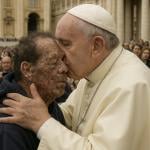
“If you understand, it is not God.” – Saint Augustine.
A striking aspect of human history is its religiosity. (http://www.scborromeo.org/ccc/p1s1c1.htm). It seems that to be human is to have some sense of the divine.
In this exposition, I will contrast the pagan and biblical concepts of God. I will also review what Catholicism teaches about God and His nature. However, we must start with the most important question any person can ask. Does God exist?
Does God Exist?
I am leery of attempting to prove the existence of God by appealing to the Bible, as doing so runs the risk of engaging in circular reasoning; assuming what one is trying to prove.
Fortunately, the great philosophical traditions provide us with a starting point, for we may say that the God of Christianity is the God of philosophy.
One of the most prevalent arguments for the existence of God is called the cosmological argument. The history of this particular argument has created several variations, but what follows is a simple overview of the cosmological argument.
We begin by observing that everything that comes into existence requires a cause. A child has parents, the child’s parents have parents, and so on. What is true of humans is true of planets and universes. Everything that begins to exist must be caused by another. Since nothing can cause itself to come into existence, there must be a cause that itself is not caused. That is the first cause of creation, and what we call God.
An alternative is to argue for an infinite regress of causes, but this is illogical. The reason is that an infinite causal chain would mean that there is no first cause. If there is no first cause, there can be no effect. If there are no effects, then nothing exists, which is absurd.
Having arrived at the first cause of existence, we may infer that such a being exists necessarily (for the reason that what does not exist necessarily requires a cause) and eternal (an uncaused first cause must always have existed).
Nevertheless, the history of mankind’s understanding of God or the gods has taken many different paths.
God and gods
The ancient world often took a polytheistic view, believing in many gods. This idea of multiple gods was prominent in the most significant power of the ancient world, the Roman Empire.
The Romans worshiped a pantheon of gods headed up by “father” Jupiter (Zeus in Greek). The various gods had certain powers split between them; for instance, Mars was the god of war, so soldiers and gladiators would sacrifice to him, and blacksmiths prayed to Vulcan, the god of fire. The Romans also believed in little “house spirits” called Lares, which were the spirits of their ancestors, and they thought if they appeased them, they would guard their households and keep the home an ordered, peaceful place. The origin of these gods came from the merging of two superstitions: one from the original inhabitants of the land and the other from the Greeks.
As the expansion of the Roman Empire brought them into contact with many other religious beliefs, the Romans absorbed those beliefs, adding the gods of conquered peoples to their collection while expecting their subjects in every place to do the same with the Roman gods.
God of the Bible
In contrast to polytheism is the God revealed in the Bible. While the pantheistic gods often were symbols of the forces of nature or simply superhuman creatures, the God of the Bible is understood to be the ground of existence and the cause of nature itself. More significantly, the Bible teaches monotheism or one God, “Hear, Israel! The Lord is our God; the Lord is one!” (Deuteronomy 6:4)
It is, in principle, impossible to define that which is infinite, since to define something is to place limits on it, and God cannot be limited. This makes explaining who or what God is a complicated task. From the perspective of philosophy, God is the eternal first cause of existence itself. What Aristotle called, “the unmoved mover.” For Aristotle as for Aquinas, movement was synonyms with change. All of creation is contingent, it is reliant on another for its change or cause. That which is the cause of this “movement” or change who itself is not moved or changed is God.
Perhaps the best that can be said is that “God is a spirit, infinite, eternal, and unchangeable, in his being, wisdom, power, holiness, justice, goodness, and truth.” (Westminster Shorter Catechism).
While Catholicism is a monotheistic religion, it makes the extraordinary claim that God exists as three persons. Is this not a contradiction?
The Holy Trinity
At the heart of the Catholic understanding of God is the Holy Trinity. The Trinity is the belief that three persons exist in the single essence that is God.
While the belief in a triune God is foundational in Catholicism, it is a great mystery. Still, this mystery may best be understood, albeit limitedly, by differentiating essence from existence.
Essence is the very nature or whatness of a thing. The essence of God is divinity. In contrast, we may say that the essence of human beings is their human nature. The existence of a thing is how it manifests itself. God manifests Himself by the three persons of the Holy Trinity.
The three persons are distinct yet one in “substance, essence or nature” (Fourth Lateran Council as quoted in the Catechism of the Catholic Church). They are the Father, the Son (Jesus Christ), and the Holy Spirit. Thus, “Tri” means three, and “Unity” means one, Tri+Unity = Trinity. It is a way of acknowledging what the Bible reveals to us about God, that God is yet three “Persons” who have the same essence of deity.
This explanation requires us to define further, or at least differentiate, a person from an individual. A person is that which exists in relation to another. An individual exists as an entity, comprised of essence and properties, but is not relational. God exists as a person in relation to the Father, the Son, and the Holy Spirit. This is the Triune God.
Still, Saint Augustine’s insight that we can never truly understand God remains. To have faith is to enter into the greatest of all mysteries.
















